Cash Flow Fight Club
Cash Flow. You love it. You want it! We’re all seeking it, but what’s the best way to generate it? Google Cash Flow and get instantly overwhelmed. With so much noise and marketing hype out there, how do you know which approach is the best for you? We’ve wrestled with massive amounts of research, opinions and experimentation trying to find the best methods. Now we’re on a mission to find the best methods and give you all the dirty details - Fight Club style! In our signature Fight Club matchups, we bring together the heavyweights of business and investing to debate the risks, rewards and the inside scoop on the best ways to generate life-changing cash flow that can put you on the path to financial freedom. And after battling it out in the arena over 3 rounds, we crown the Champion. We alternate Fight Club matchups by going In the Champion’s Corner, where we’ll discover what it takes to forge a champion. Mindset, high performance habits, best-in-class behaviors and more of what it takes to be successful – in your finances and in life. So whether it’s passive income, real estate, side hustles or cash-flowing business ventures, we’re bringing you all the details in the most informative and entertaining show on the airwaves. Join us to see who’ll reign supreme! Who will take home the title of Cash Flow Fight Club Champion. And the 1st rule of the Cash Flow Fight Club – hit subscribe and don’t miss even 1 battle among the titans of Cash Flow. It’s going to be epic!
Episodes

Tuesday Oct 14, 2025
Tuesday Oct 14, 2025
In this episode of Cash Flow Fight Club, we’re joined by Kristi Kandel, a powerhouse in local real estate development who’s flipped the script on who gets to lead the shaping of our communities.
With nearly 20 years of experience and over $450M in developments, Kristi’s worked on everything from national retail rollouts to adaptive reuse and clean energy infrastructure. But today, she’s focused on helping locals take back control through her operating system for development, Dev-OS.
She shares how the aftermath of Hurricane Ian in Fort Myers Beach transformed her mission — and how regular people can now lead impactful local real estate development without waiting for permission or outside capital. From funding tips to dealing with cities to repurposing vacant buildings, Kristi offers a playbook anyone can follow.
We also dig into how she went from semi-pro beach volleyball to opening a regional office at 25, why developers blow millions unnecessarily, and the small-town coffee shop conversation that led to a 19-lot development. This episode is packed with practical advice, real stories, and next steps for anyone ready to build something meaningful where they live.
Here are some power takeaways from today’s conversation:
00:00 - Introduction02:45 - How Kristi got her first break in development05:00 - Scaling retail projects across California14:00 - Leaving corporate to start her own consulting firm20:00 - The Hurricane Ian rebuild and her shift to local real estate development25:00 - Why locals are key to long-term community stability30:00 - How to get started with your own small-town project33:00 - Building your five-person development team35:00 - Why most developers don’t know what they’re doing
So much power lies within communities, and communities are where real connections happen.
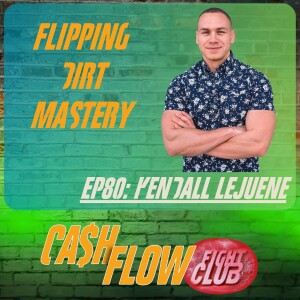
Wednesday Apr 16, 2025
Wednesday Apr 16, 2025
Land investing is booming — but what separates those making $2K from those earning $120K per deal?
In this episode of the Cashflow Fight Club podcast, we sit down with Kendall Lajeune, founder of the Only Land Fans podcast and Facebook community with over 9,000 members, to break down his rise from high school band director to land investing leader.
Kendall shares the exact steps he used to scale up from zero to six-figure land flips — often without spending a dime. From his first infill lot to ditching houses entirely, he explains why land investing offers higher margins, less risk, and more scalability. He also discusses how he built a thriving community by focusing on education first — and what beginners get wrong when trying to enter the land space.
We dive deep into the power of wholesaling, the truth about land investing competition, and how to stand out using stellar customer experience and creative deal structures.
Plus, Kendall talks tech: how AI tools like ChatGPT are revolutionizing real estate operations — and how smart investors are already using them to build scalable systems and close more deals.
If you’ve ever wondered how to start land investing, scale your deals, or build a brand around it — don’t miss this one.
Here are some power takeaways from today’s conversation:
00:00 - Kendall’s journey from music teacher to real estate investor02:26 - Why he left houses behind for land investing04:45 - Breaking down his first “zero-risk” land flip07:10 - Building Only Land Fans into a top podcast and Facebook group13:08 - Standing out in a crowded market with customer experience17:00 - How to create referral-worthy buying and selling journeys20:00 - Why wholesaling and assignments are best for beginners28:08 - Rural land trends and current state of the market31:44 - Why nimbleness is the real key to land business success38:00 - How AI is transforming real estate systems in 202443:00 - Leveraging ChatGPT and Claude to streamline real estate ops
Check out the best kept real estate game in town - land flipping - with Kendall LeJeune.

Tuesday Apr 01, 2025
Tuesday Apr 01, 2025
What if the biggest obstacle to your success wasn’t external, but internal? In this episode, high-performance coach Dovid Azerad joins us to talk about personal agency, leadership, and mindset mastery.
Dovid’s background as an educator and school administrator gave him deep insight into human behavior, motivation, and the way people either claim control or give it away. Now, he helps professionals, especially new C-suite leaders, navigate self-doubt, decision-making, and high-stakes leadership roles.
We discuss why so many people feel stuck in life or business, how to break free from limiting beliefs, and why curiosity is the most powerful tool for transformation. If you're looking for a mindset shift that will help you take action and own your success, this episode is for you.
Here are some key takeaways from today’s conversation:
00:00 - Introduction02:45 - How Dovid went from education to coaching07:00 - Why people lose personal agency (and how to reclaim it)14:00 - The power of curiosity in business and life22:00 - Handling skepticism, doubt, and imposter syndrome31:15 - Fear of failure vs. fear of success39:00 - Building confidence and resilience45:00 - Dovid’s advice for new leaders in high-pressure roles
Through years of coaching and leadership, Dovid has found that confidence isn’t something you’re born with—it’s something you build. He shares how to cultivate self-trust and resilience through mindset shifts and strategic action.
Connect with Dovid on LinkedIn
For more about Dovid: https://nextarc.co/
Visit us at https://flippingdirt.us/ to discover the best cash flow secret in real estate.
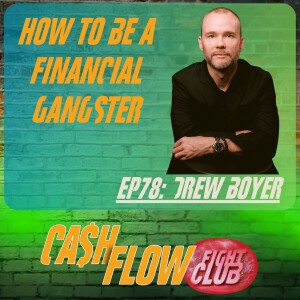
Wednesday Feb 26, 2025
Wednesday Feb 26, 2025
Hip Hop X Finance with Drew Boyer
From Beats to Bankrolls: The Real Talk on Money Moves
In this episode, we’re dropping bars with Drew Boyer, the financial planner who went from drummer to money maestro. He’s breaking down the game on how hip hop’s flashiest stars and regular folks alike can learn the rules of the money game—before they end up broke, busted, and disgusted.
Drew’s 20+ years in financial planning and his love for music collide in his new book, Hip Hop X Finance. He’s using the lessons from 50 Cent, Jay-Z, and Ice Cube to school us on financial literacy, debt traps, and stacking paper the smart way.
Here’s what went down:
[00:00] Introduction to Drew Boyer and his journey from music to money
[03:33] The inspiration behind Hip Hop X Finance
[08:15] Why financial literacy is like learning the lyrics—know it or get played
[12:45] The truth about credit cards: When minimum payments become maximum pain
[17:30] Jay-Z’s advice: If you can’t buy it twice, you can’t afford it
[22:15] Debt Remediation 101: How Drew negotiated his way out of $100K in debt
[27:55] From flashy videos to bankrupt rappers—what you see ain’t always what they own
[33:22] Budgeting like a boss: How to live your best life without fronting
[38:10] Mindset over materialism: Why financial freedom is the real flex
RESOURCES
HipHopxFinance.com
Facebook
TikTok
Instagram
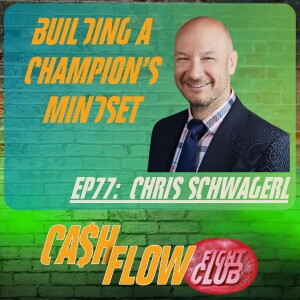
Wednesday Feb 19, 2025
Wednesday Feb 19, 2025
In this episode of the Cashflow Fight Club podcast, Chris Schwagerl shares his profound personal journey from the brink of despair to a life of triumph and fulfillment. After being diagnosed with chronic kidney disease, Chris faced major life challenges that dramatically shaped his path. Determined to live long enough to walk his daughter down the aisle, Chris transformed his mindset and took control of his destiny. Now a performance psychologist, Chris discusses how he helps others mold their identities and remove limiting beliefs to unlock their true potential. He emphasizes the power of vulnerability and storytelling, and how embracing one's authenticity can lead to remarkable success. This episode is rich with lessons on overcoming adversity, pursuing entrepreneurship, and achieving a fulfilled life.
00:00 Life-Changing Diagnosis and Determination
01:56 Introduction to Chris Schwagerl
03:18 Chris's Background and Career Journey
07:10 The Entrepreneurial Mindset
13:09 Overcoming Limiting Beliefs
27:32 Understanding Personal Identity
28:41 The Power of Moldable Identities
29:17 Exploring Childhood Influences
31:34 Facing Mortality and Legacy
35:04 The Impact of Vulnerability
35:34 Mindset and Coaching
46:05 Gratitude and Closing Thoughts
RESOURCES
Connect with Chris: https://www.linkedin.com/in/chris-schwagerl/
Chris' Performance Program: www.infiniteskies.life
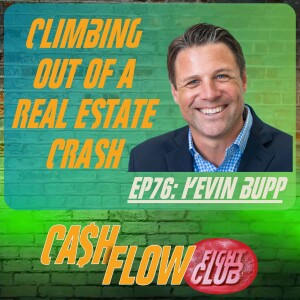
Wednesday Feb 12, 2025
Wednesday Feb 12, 2025
In this episode, seasoned real estate investor Kevin Bupp shares his journey from owning single-family homes to building a substantial portfolio in mobile home parks and parking lots.
Kevin discusses the impact of the 2008 financial crisis on his investments and how he navigated the challenges to come out stronger. He highlights the value of health and fitness in maintaining resilience during tough times and the importance of focusing on controllable aspects of life.
Kevin also dives into his criteria for selecting profitable investments in mobile home parks and parking facilities, offering valuable insights for investors looking to diversify their portfolios in various asset classes.
Additionally, Kevin emphasizes the importance of mentoring and building a supportive team.
KEY HIGHLIGHTS
00:00 Introduction to Kevin's Real Estate Journey
00:07 The 2008 Financial Crisis and Its Impact
00:51 Rebuilding and Shifting Focus to Mobile Home Parks
02:43 Kevin's Background and Early Real Estate Ventures
03:39 Mentorship and Early Investments
06:26 Challenges and Strategies in Real Estate Investing
12:40 Navigating the 2008 Crisis: Personal and Professional Struggles
23:02 Starting New Ventures: Craft Beer and Running Club
23:56 Rebuilding Phase: From Foreclosure to New Beginnings
24:43 Transition to Commercial Properties
26:59 Discovering Mobile Home Parks
28:35 First Mobile Home Park Purchase
29:25 Scaling Up: Proving the Business Model
36:23 Investment Strategies: Mobile Home Parks and Parking Lots
44:13 Gratitude and Final Thoughts
Real estate and investing are not without turbulence and even deep crisis sometimes. Kevin delivers an inspiring message about how to maintain focus and resilience in the face of adversity and come out stronger for having been through it.
RESOURCES
Connect with Kevin on LinkedIn: https://www.linkedin.com/in/kevinbupp/
Sunrise Capital: https://sunrisecapitalinvestors.com/
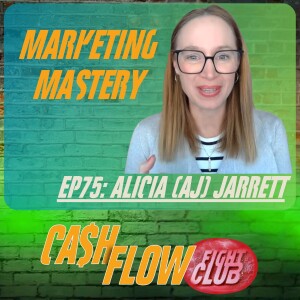
Wednesday Feb 05, 2025
Wednesday Feb 05, 2025
In this episode of the Cashflow Fight Club Podcast, we sit down with AJ, founder of Supercharged Offers, to talk about scaling a real estate business the right way.
AJ shares her journey from a corporate career in human resources and leadership development to becoming a successful real estate investor in the U.S. She reveals how she built a marketing system out of necessity—one that now helps investors generate leads, close more deals, and grow their businesses without the overwhelm.
If you’re struggling with marketing, lead generation, or scaling your real estate business, this episode is packed with insights on how to create a seamless system that works for you.
Here are some key takeaways from today’s episode:
00:00 – Welcome AJ to the Cashflow Fight Club Podcast01:08 – AJ’s background: From corporate life to real estate investing02:55 – Fix-and-flip vs. vacant land: What led AJ to change strategies05:00 – How AJ identified a massive gap in real estate marketing07:30 – Why most real estate investors struggle with marketing10:45 – The birth of Supercharged Offers: Turning a problem into a business14:20 – The importance of testing and refining marketing strategies18:50 – How to optimize cold calling, direct mail, and digital marketing23:15 – The biggest mistakes investors make when outsourcing marketing27:40 – AJ’s advice for scaling a real estate business efficiently32:10 – Who should use Supercharged Offers (and who shouldn’t)35:50 – Why having the right mindset and systems is the key to success
AJ breaks down exactly how real estate investors can streamline their lead generation process, avoid common marketing pitfalls, and focus on closing deals rather than managing multiple vendors.
If you want a more efficient, scalable real estate business, don’t miss this episode!
Resources Mentioned:
Supercharged Offers – Visit Website
BuyerFinder.io – AJ’s tool for automated buyer outreach
If you're interested in creating stress-free, consistent cash flow, you need to be Flipping Dirt. Check out more at https://flippingdirt.us
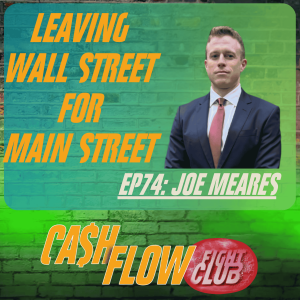
Wednesday Jan 29, 2025
Wednesday Jan 29, 2025
In this episode of the Cashflow Fight Club podcast, we’re joined by Joe Meares, a former Wall Street professional turned real estate investor and mentor. Joe shares how a disappointing bonus at his finance job sparked a journey into real estate investing, leading him to create a thriving portfolio of rental properties.
We dive into Joe’s practical approach to building wealth through real estate while maintaining a full-time job. From leveraging the BRRRR strategy to scaling up to multifamily and creative financing, Joe outlines actionable tips for anyone looking to break into real estate.
Joe also discusses the importance of mentorship, the power of networking, and how living below your means can set the foundation for financial independence. Whether you’re a first-time investor or looking to take your portfolio to the next level, this episode is packed with insights to help you start and scale your real estate journey.
Here are some key takeaways from today’s conversation:00:00 - Introduction and Joe’s background in finance06:49 - Lessons from early investing: From baseball cards to stocks13:00 - The pivotal bonus event that inspired Joe’s real estate journey20:10 - Mastering the BRRRR strategy to grow your portfolio26:00 - Selecting the right real estate market: Joe’s criteria and experience34:50 - Creative financing: How Joe leveraged seller financing for a 22-property portfolio41:00 - The importance of mentorship, mindset, and building a strong network
Episode Highlights:
[13:00] The Bonus That Changed EverythingJoe reflects on the moment a disappointing bonus made him rethink his financial future. This pivotal event pushed him to explore secondary income streams, leading him to real estate investing.
[20:10] The BRRRR Strategy in ActionJoe explains how the Buy, Rehab, Rent, Refinance, Repeat (BRRRR) method allowed him to grow his portfolio quickly while creating long-term cash flow.
[26:00] Choosing the Right MarketJoe shares his process for selecting markets, including focusing on properties under $100,000 and ensuring they meet the 1% rule.
[34:50] Creative Financing for Large DealsJoe breaks down a 22-property portfolio acquisition where he used seller financing to close the deal. He emphasizes the importance of relationships in making creative financing possible.
[41:00] Mentorship and NetworkingJoe talks about the role of mentorship in his success and how building relationships can open doors to deals and opportunities.
Connect with Joe on LinkedIn and at KAYJAY consulting.
Financial and lifestyle freedom can be yours, but you have to act!
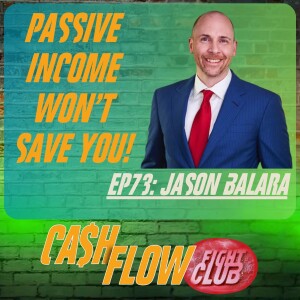
Wednesday Jan 22, 2025
Wednesday Jan 22, 2025
Passive income alone won't save you or make you wealthy!
Dr. Jason Balara shares his fascinating journey from veterinary surgery to real estate investing in this engaging episode. As a multifamily syndicator and founder of Lark Capital, Jason opens up about his unique career transition, lessons learned in construction and real estate, and the strategies that have helped him scale his business.
He also discusses work-life balance, the importance of adaptability, and how focusing on value creation has driven his success. Whether you're an aspiring investor, a seasoned pro, or someone looking for inspiration to chase your dreams, Jason’s story offers actionable insights and heartfelt reflections.
Key topics discussed:
How Jason balanced veterinary surgery with real estate investing
Lessons from early DIY projects and house hacking
The power of creating value in real estate
Shifting strategies during market changes
Finding work-life balance through entrepreneurship
Power Takeaways:
Create value in any market by solving problems or adding improvements.
Keep an active income source while building passive wealth.
Invest with a buffer—don’t stretch finances too thin.
Leverage mentorship and networking to accelerate learning.
Adapt and pivot when challenges arise.
00:00 Introduction: The Importance of Active and Passive Income
01:01 Meet Dr. Jason Ballara: A Multifaceted Professional
02:25 Jason's Journey: From Veterinary Surgeon to Real Estate Investor
04:08 The Power of Real Estate: Jason's Early Experiences
05:32 Balancing Careers: Construction and Veterinary Medicine
12:18 Mentorship and Personal Growth
21:09 The Role of Kindness in Success
23:40 Modern Business Models: Leading with Kindness
26:30 Transition to Multifamily Real Estate
26:54 Balancing Family and Career
28:46 Discovering Out-of-State Investing
29:55 The Syndication Revelation
30:57 Navigating Market Shifts
32:53 Overcoming Financial Challenges
34:16 Adapting Business Strategies
41:53 Future Plans and Reflections
Resources
www.larkcapital.com
Jason on LinkedIn: https://www.linkedin.com/in/jasonbalara/
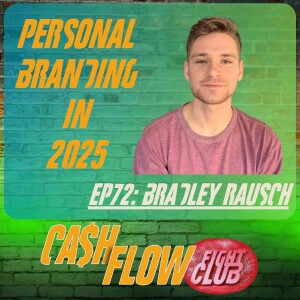
Wednesday Jan 15, 2025
Wednesday Jan 15, 2025
Successful personal branding in 2025 is critical.
In this episode, Bradley Rausch takes us behind the scenes of building a successful personal branding strategy for real estate professionals. Bradley has mastered the art of creating engaging, organic content that resonates with investors and clients on platforms like LinkedIn and Instagram.
He shares his journey from sales to consulting and explains why personal branding is an essential asset for anyone looking to scale their business in real estate. Bradley’s insights on content creation, including how to craft short-form videos and leverage partnerships, provide a roadmap for standing out in today’s competitive market.
The conversation also dives into LinkedIn’s untapped potential for real estate investors. Bradley predicts the platform’s “golden era” in 2025 and explains how professionals can position themselves as thought leaders and connect with high-quality leads.
If you’re ready to transform your personal branding strategy and take your content to the next level, this episode is packed with actionable advice tailored to the real estate industry.
EPISODE CHAPTERS
00:00 The Evolution of Social Media Eras
00:32 Introducing Bradley Rausch: Master of Personal Branding
01:50 Bradley's Journey: From Sales to Client Success
03:55 Building a Personal Brand: Bradley's Health Coaching Success
10:34 Effective Content Strategies for Social Media
18:53 The Power of Organic Content in Real Estate
22:53 Leveraging LinkedIn for Real Estate Success
29:32 Scaling on LinkedIn: The Sharing Game
29:46 Etiquette and Permissions for Tagging and Sharing
32:39 Documenting vs. Creating Content
33:33 The Rise of Video on LinkedIn
34:22 Personal Profiles vs. Business Pages
36:12 Moving Leads Off Social Media
37:22 Creating Engaging Video Content
46:20 The Importance of a Strong Hook
50:04 Building a Personal Brand for Real Estate Investors
53:26 Gratitude and Closing Remarks
CONNECT
Bradley on LinkedIn: https://www.linkedin.com/in/bradley-rausch/
Instagram: https://www.instagram.com/bradleyyrausch/
Bradley's top viral hooks
#PersonalBranding #ContentCreation #LinkedInMarketing #RealEstateInvesting #RealEstateMarketing #OrganicContent #SocialMediaForInvestors #RealEstateContent #BuildingABrand #LinkedInTips #personalbranding2025
#RealEstateStrategy #ContentMarketingTips #ShortFormVideo #SocialMediaGrowth #BrandingForProfessionals #RealEstateConsulting #LinkedInRealEstate #GrowYourBrand #RealEstateInvestors #VideoMarketingTips
#InvestorBranding #LinkedInForBusiness #RealEstateLeads #RealEstateVideoContent #RealEstateInfluencer








